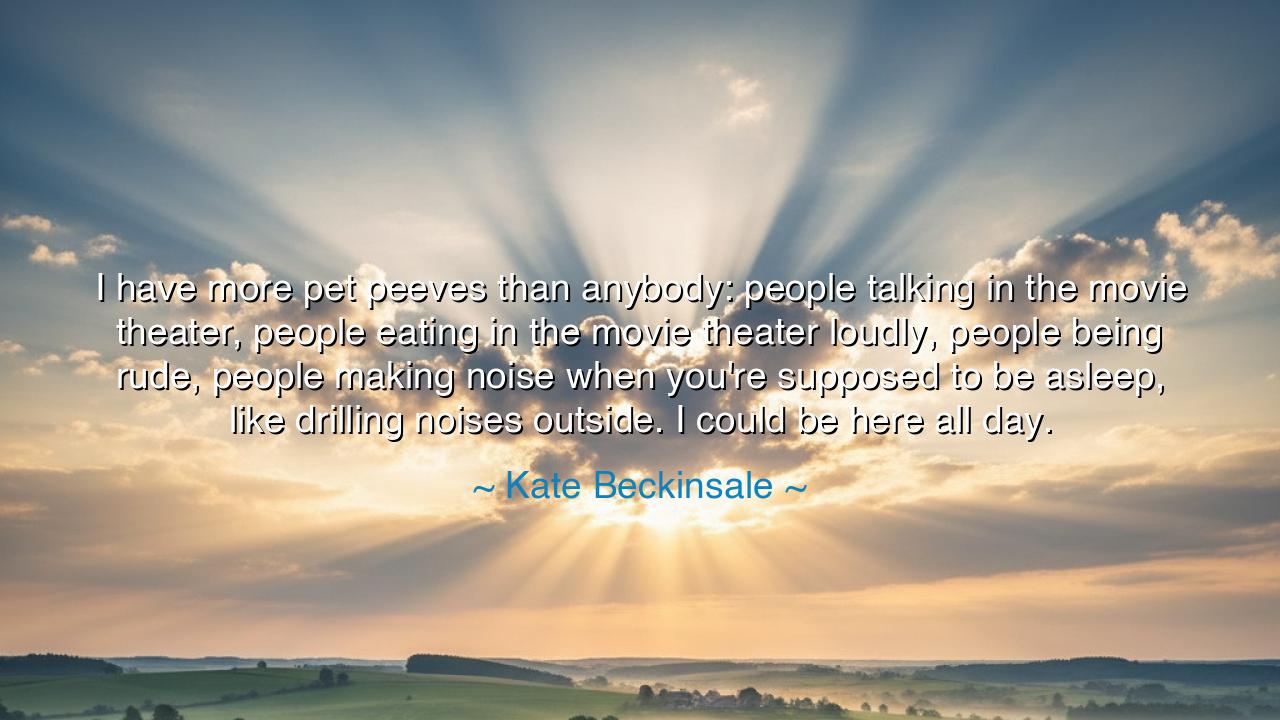
I have more pet peeves than anybody: people talking in the movie
I have more pet peeves than anybody: people talking in the movie theater, people eating in the movie theater loudly, people being rude, people making noise when you're supposed to be asleep, like drilling noises outside. I could be here all day.






The actress Kate Beckinsale once confessed with both humor and exasperation: “I have more pet peeves than anybody: people talking in the movie theater, people eating in the movie theater loudly, people being rude, people making noise when you're supposed to be asleep, like drilling noises outside. I could be here all day.” At first, her words may seem merely a list of irritations, a lighthearted admission of impatience. Yet beneath this surface is revealed a greater truth: that what we call pet peeves are not only annoyances, but mirrors of deeper desires—for peace, for respect, for order, and for the quiet beauty of life undisturbed.
When she speaks of “people talking in the movie theater” or “eating loudly,” it is not simply the sounds themselves that offend, but the breaking of an unspoken covenant. The theater is a sanctuary of story, a shared temple where many gather to enter into another world. To disrupt it with chatter or careless noise is to betray that sacred space. In her irritation is hidden a yearning for reverence: the belief that certain places and times require silence, so that all may partake in the wonder of imagination undisturbed.
Her mention of “people being rude” points to an even greater truth. Rudeness is the breaking of harmony in human community. It is the failure to see the dignity of another, the failure to remember that every soul carries its own weight of burdens and joys. Beckinsale’s pet peeve here is not trivial; it is a call to the ancient law of courtesy, a reminder that respect for others is the oil that keeps society’s wheels from grinding to dust.
The frustration of “drilling noises outside when you are supposed to be asleep” is perhaps the most primal of all. For sleep is sacred; it is the body’s renewal, the spirit’s restoration, the silence in which life regathers its strength. To be robbed of this by the careless noise of others is no small matter—it is to be denied the rhythm of existence itself. Even the ancients understood this: the Romans outlawed certain work at night, and monastic orders designed their cloisters to guard the sanctity of rest. In Beckinsale’s lament we hear an echo of this timeless truth.
History gives us an example in the philosopher Seneca, who often wrote about the tyranny of noise. Living in Rome, surrounded by clamor—chariot wheels, hammering blacksmiths, shouts of merchants—he confessed his deep irritation at the way constant noise scattered the mind and destroyed inner peace. Yet from this irritation he drew wisdom: he learned that the soul must build its own fortress of calm, while also yearning for a society more mindful of silence. Beckinsale’s words, though modern and lighthearted, resonate with Seneca’s ancient cry for respect of stillness.
The origin of her reflection lies not only in her personal quirks, but in a universal truth: all human beings crave spaces of peace and respect. What she calls “pet peeves” are, in reality, violations of order and harmony—moments when the selfishness of others interrupts the fragile balance that allows joy, rest, and shared experience to flourish. Her jest that she “could be here all day” is both comic and revealing, for the list of such violations is endless, as endless as the ways in which people forget the presence of others.
The lesson for us is this: do not dismiss irritations as trivial, but listen to what they reveal. They show us the values we hold most dear: silence, courtesy, peace, respect. Instead of feeding anger when these are broken, let us strive to embody them ourselves. If we dislike noise in sacred spaces, let us keep silence. If we dislike rudeness, let us show kindness. If we dislike carelessness, let us walk with awareness. In doing so, we lessen the burden of another’s “pet peeves” and become guardians of harmony.
Practical action follows simply. In the theater, honor silence. In public, eat and speak with consideration. When others rest, restrain your noise. And above all, treat every person with the respect that you, too, desire. These are not mere manners; they are the threads that weave peace into daily life. By attending to such small courtesies, we build a world where fewer pet peeves are born, and more hearts find ease.
Thus, Kate Beckinsale’s playful confession—“I have more pet peeves than anybody”—becomes more than complaint; it becomes an admonition to future generations. It reminds us that the small frictions of life are not meaningless, but signals pointing to deeper needs of the soul. Let us honor those needs, in ourselves and in others, so that we may live not in constant irritation, but in shared respect, quiet, and harmony.






AAdministratorAdministrator
Welcome, honored guests. Please leave a comment, we will respond soon